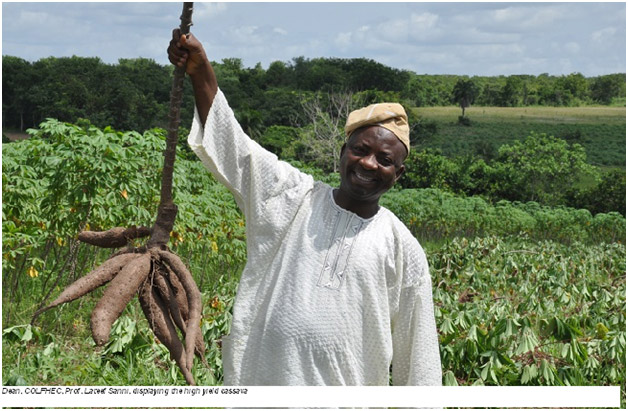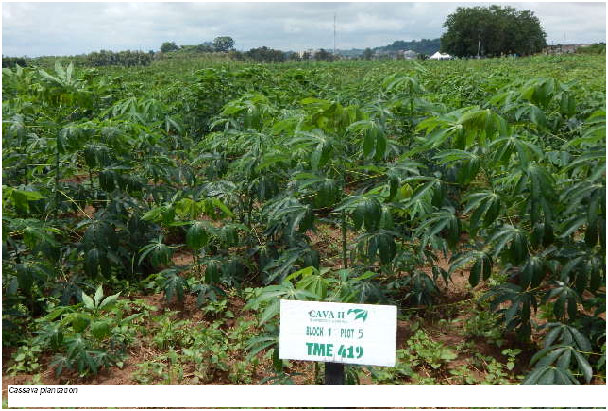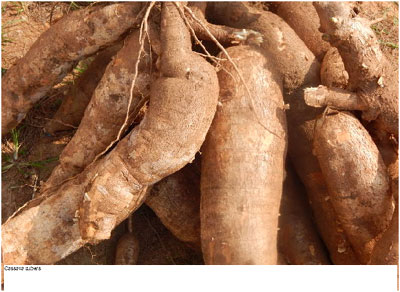The Cassava: Adding Value for Africa (CAVA II), a research project sponsored by the Bill & Melinda Gates Foundation, is poised to promote value addition to cassava. CAVA II is led by the Federal University of Agriculture Abeokuta, Nigeria, working closely with the Natural Resources Institute of University of Greenwich, United Kingdom; International Institute of Tropical Agriculture, Nigeria, Food Research Institute, Ghana; Tanzania Food and Nutrition Center, Tanzania; Africa Innovations Institute, Uganda; Chancellor College, University of Malawi and other partners. FUNAAB’s Director of Grants Management, Professor Kolawole Adebayo, is the Project Director.

The project is implemented in five African countries namely: Nigeria, Ghana, Tanzania, Uganda and Malawi, with the aim of improving the livelihoods and incomes of at least 200,000 value chain actors, especially smallholder farmers and processors, by at least USD177 million in five years. This will be achieved through stimulating the sale of more than two million tons of cassava into HQCF, starch, ethanol and other cassava product value chains.

Making this disclosure was the Dean, College of Food Science and Human Ecology (COLFHEC) of the University and the Country Manager of CAVA II, Professor Lateef Sanni. According to the Don, his team’s current research interest is on the industrial up-scaling of cassava through which they encourage stakeholders to make use of cassava as industrial raw material, by making it possible for them to transit from the traditional sector to the industrial sector.
Professor Sanni, who has been working on the C:AVA Project since 2008, said the major problem which the work is determined to solve is the challenge of inadequate raw material supply, noting that between 2004 and 2007, former Nigerian President, Chief Olusegun Obasanjo, had advocated 10 percent inclusion policy of cassava flour into wheat for the baking of bread and other diversified use, but this suggestion could not be achieved due to the unavailability of raw materials.
Hence, the research team intends to get the specific kinds of farmers, who would replace the low yield cassava root with high yield cassava roots so that in the future, there would be the spill-over effect, while the farmers would in turn gain from this effort, in addition to entrepreneurs that would be selling their cassava stems to others. He noted that the special interest in cassava is not out of place since Nigeria is the highest producer of the crop in the world, adding that cassava is drought-tolerant, by being able to survive in any location. He stated that of all the agricultural commodities existing today, cassava had the highest produce level of about 54 million tonnes per annum when compared to yam, which is about 38 million tonnes or cereals which range between 10 and 12 million tonnes.
Professor Sanni disclosed that for a researcher or farmer to achieve profitability and success in commercial cassava farming, it should be mechanised, using tractors, processing machineries with high-yielding roots and best agronomic practices. For him, mechanised farming would result in low production cost of close to about N4,000 per tonne as against the N10,000 to N14,000, which is presently obtainable. The Dean noted that the project on cassava was germane to national development as cassava is a competitor to oil, if well tapped. He added that the project could bring about food security in the country, due to the available disease-resistant and highly yielding cassava roots, uptake of industrial starch-ethanol by end-user markets and the political will of the Federal Government of Nigeria. He noted that cassava remained a source of income generation as individuals, small medium entrepreneurs and large scale entrepreneurs could easily make a fortune from the bye-products of cassava such as starch, flour, fufu, among others.
Highlighting some of the achievements so far made by the CAVA II Project, the Country Manager noted that they are basically supporting small and medium entrepreneurs in the country. He cited Rivers State, where Dr. Joy Ejiofor is the Zonal Coordinator, while Mrs. Ugo Chijioke supervises the work going on in Abia and Imo States, stating further that the project was also working closely with the Osun, Ondo, Ogun, Oyo, Ekiti, Kogi and Kwara Agricultural Development Programmes (ADPs), by liaising with the small and medium entrepreneurs in the states and farmers working with the Agricultural Media Resources and Extension Centre (AMREC) of FUNAAB. Professor Sanni also named other collaborators as the Federal College of Agriculture, Akure; Oyo State College of Agriculture, Igboora; Justice, Peace Development and Movement of the Catholic Church; Allied Atlantic Distilleries Limited (AADL), Igbesa; Thai Farms, Ososa; Magna Starch Industry, Akure; Psaltry Starch Industry, Oyo State and Greentech Starch Industry, Agbara, among others.

The Dean of COLFHEC added that CAVA II coordinates the train-the-trainers initiative on best agronomy practices, quality management and linking farmers with processors, advocacy programmes, liaising with the Federal Ministry of Agriculture and Rural Development on the training of master-bakers, cassava processors and other investors. He disclosed that this year, the project distributed about 2,550 bundles of stem cuttings to 1,450 farmers and 215, 515 tonnes of fresh roots to farmers from eleven locations in Nigeria, adding that in the University’s Institute for Food Security, Environmental Resources and Agricultural Research (IFSERAR), CAVA II already has a Demonstration Farm, on which one hectare is planted per month.
The Dean lamented that despite the milestones achieved by CAVA II, there were still many challenges facing the project. These include inconsistency in public policy implementation as this had been a major constraint to the growth and development of effective research, adding that farmers and processors were unable to access government credit facilities, hence little or no funds for research activities. He also observed that poor infrastructural network was another challenge facing research in the country, noting that a nation that wishes to accomplish any significant economic development should invest more in the provision and maintenance of basic infrastructural facilities like good road network, electricity supply and transportation. The Don, however, said the country was also not doing well in research because of non-involvement of new and young brains in research activities.
The Dean noted that the team had been able to carry the private sector players along while planning and executing projects, saying they had always maintained their integrity and practiced transparency. Looking into the future, Professor Sanni observed that the next ten years seem to be very bright, as there would be an emergence of nothing less than 10 large industries, considering the efforts being put in place, stressing that by that time, cassava would have transcended into an industrial crop and its exportation from Nigeria would be on a very large scale.
The Dean, therefore, recommended that adequate funds should be pumped into research activities, while the government should compel multinational companies to fund centers of excellence in each geo-political zone, adding that government should stop bringing in expatriates but rather make use of local experts and consultants in our institutions. Furthermore, he suggested that retired University staff and graduates should be engaged in running different ventures in the University. He equally observed that the University’s Yam Roasting Festival should be enlarged into an Agricultural Fair that would be open to farmers, private individuals, government and multinational companies and should last for a longer period of about two to three days, to promote healthy competition and stimulate better ideas from the participants.
